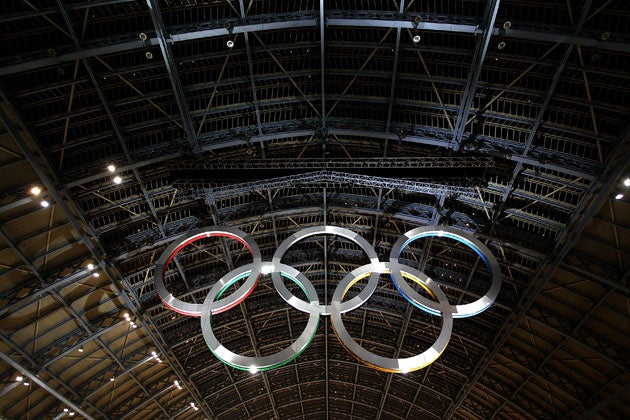All in the detail: from lighting the flame to getting those tickets
Perplexed by the hype and scale of preparation? The hard work for athletes and organisers is not over yet

Your support helps us to tell the story
From reproductive rights to climate change to Big Tech, The Independent is on the ground when the story is developing. Whether it's investigating the financials of Elon Musk's pro-Trump PAC or producing our latest documentary, 'The A Word', which shines a light on the American women fighting for reproductive rights, we know how important it is to parse out the facts from the messaging.
At such a critical moment in US history, we need reporters on the ground. Your donation allows us to keep sending journalists to speak to both sides of the story.
The Independent is trusted by Americans across the entire political spectrum. And unlike many other quality news outlets, we choose not to lock Americans out of our reporting and analysis with paywalls. We believe quality journalism should be available to everyone, paid for by those who can afford it.
Your support makes all the difference.So what happens on 27 July 2012?
At 7.30pm the Danny Boyle-designed Opening Ceremony will begin in the Olympic stadium – minus some of Britain's biggest names as the athletes and swimmers will not be there. Around 10pm the flame will be lit – Steve Redgrave is the bookies' favourite – and the XXX Olympiad will be officially under way.
However, there will already have been some sport – the archery competition begins at 9am on the nursery ground at Lord's, while 14 games in the football event will already be done and dusted. The first actual sport takes place in Cardiff's Millennium Stadium on 25 July with the opening football matches.
Do I have any chance of getting a ticket?
For the Millennium Stadium, certainly – football is the sport that is struggling to shift tickets and acres of empty seats on day one of competition in Cardiff and Glasgow threaten an embarrassing opening to the biggest sporting event Britain has hosted. Elsewhere, ticket sales have been spectacular, but there will be further opportunities to get into the Games.
In December another 1.2 million tickets across all 26 sports will go on sale – those among the 1.9 million who failed to get tickets in the original ballot are likely to be offered first option through a first-come, first-served process. Next year non-event tickets will be put on sale – they will allow holders to go into the Park for the Olympic experience and to watch events on a big screen. A Wimbledon-style pass out system is planned, meaning Park ticket holders can get into venues as others leave.
Is all the building complete?
Today the Aquatics Centre is opened – Tom Daley will take the first plunge into the diving pool live on BBC 1 this evening – becoming the sixth completed venue in the 560-acre Olympic Park. The construction work by the Olympic Delivery Authority (ODA) has gone better than could have been expected, especially as it began with the Wembley fiasco casting a dark shadow from the other side of the capital. "On time and within budget" has become the mantra of all connected with the Games in recent days and it is a feat that deserves acknowledgement.
What's the bill going to be?
The budget was settled at £9.3bn three years ago from an initially optimistic figure of £2.4bn when London pitched its bid in 2005. The building work has a budget of £8.1bn, with the ODA estimating that around £6bn of that has gone to British businesses. The London organisers, Locog, have a budget of £2bn, which is raised through sponsorship, ticket and merchandise sales.
ODA, Locog, DCMS – who are all these people, and what do they do?
A number of bodies are involved in delivering the Games on behalf of the International Olympic Committee, the global governing body. The ODA builds the Park and then hands over to Locog, the London organising committee of the Olympic Games, to give it its full title. It is Locog, under Sebastian Coe, which runs the Games itself. As well as the IOC – stay with me – it also has to answer to the Department of Culture, Media and Sport, the Home Office, which oversees the security operation, and the London Mayor's office, which looks after the transport. And that's not to forget the BOA – the British Olympic Association, the body that runs Team GB, the men and women who will go for the medals.
So how will Team GB actually do?
The aim is to win more medals across more sports than the 47 collected in Beijing in 2008. Confidence across the Olympic sports is high – many of them are estimated to be in a stronger position a year out from this Games than they were before Beijing. Jessica Ennis, Phillips Idowu and Dai Greene will lead the athletics challenge, while Rebecca Adlington is still the one to watch in the pool. Cycling, rowing and sailing are again likely to provide the bulk of the medals – Ben Ainslie is a strong favourite to win a fourth successive gold – but look out for Britain's canoeists, Sarah Stevenson in tae kwon do and both the men's and women's hockey sides.
Join our commenting forum
Join thought-provoking conversations, follow other Independent readers and see their replies
1Comments